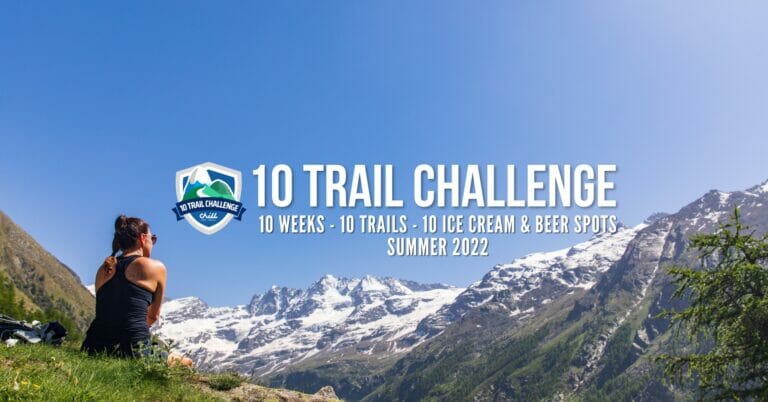This is the latest installment in the Hops Among Friends series, which showcases the people that make up the craft beer scene on the BC Ale Trail. In this edition, Kim Lawton interviews Martina Solano Bielen from KPU.
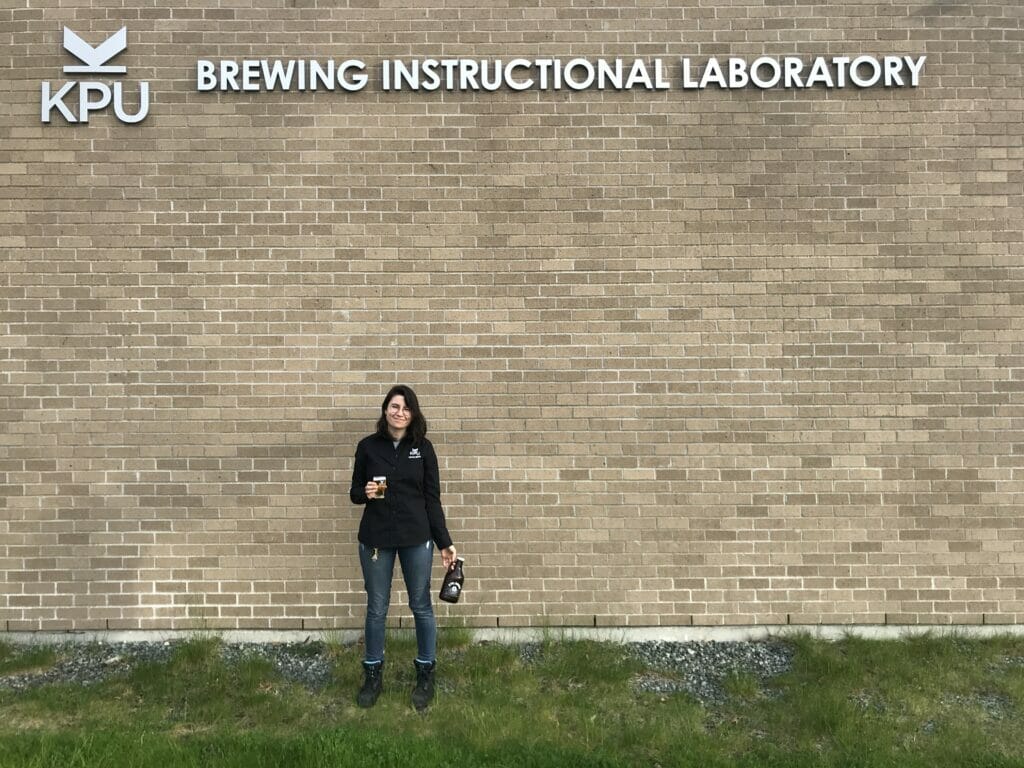
I spoke with Ashley Brooks, the Quality Control Manager at Four Winds Brewing in my most recent Hops Among Friends interview. At the end of our discussion, Ashley selected who I would interview next. She chose Martina Solano Bielen from Kwantlen Polytechnic University (KPU) and the KPU Brew Lab. KPU’s Brewing and Brewery Operations program offers BC’s only Brewing Diploma program and was the first brewing program in Canada recognized by the Master Brewers Association of the Americas (MBAA) for a standard of excellence in brewing education. The KPU Brew Lab was established in 2015 in Langley on the Fraser Valley Ale Trail.
It was a fascinating conversation with Martina. I really enjoyed learning more about the Brewing Diploma program at KPU, their hands-on learning, and the brewing projects the students complete. It provides an exciting look at the future of BC’s craft beer industry.
Kim: How did you get your start in craft beer?
Martina: I have my master’s degree in microbiology, which I received from McGill University in Montreal. One of my colleagues at the time was doing his PhD in microbiology and he was also a big home brewer. It was the first time I had seen someone home brewing, and I got really interested in brewing. When I finished my degree, I decided that I wanted to apply my knowledge in the brewing field. I thought it would be a cool industry to be a part of and I was excited to use my knowledge of microbiology to make beer.
While I was doing my degree in Montreal, I also did some mentoring, and I was doing some teaching in labs that I really enjoyed. So, when the opening came up at KPU in the microbiology and chemistry part of the brewing program, it felt like a great way to get into the scene. My then-boyfriend, now husband, was from BC, so we moved to BC in 2015 and I started working at KPU soon after. It was a perfect fit for me to be both teaching and working in the brewing field.
I really enjoy working at KPU because it’s a great place to learn. When I started at KPU, I had so much to learn about brewing, beer styles, and brewing techniques. And I did learn. I soaked up knowledge from our faculty, I put it to use when I brewed, and I always learned something new when I taught as an instructor. Plus, as the students coming to the program were really interested in craft brewing and talking about breweries, I got to learn about the craft beer scene in BC very quickly.
Kim: What do you love most about working at KPU?
Martina: On one side, I love the opportunity that I have to work with a whole new group of students every year that are open-minded and excited to learn. The students always have really good questions and I learn from their experiences too.
Our students come from diverse backgrounds. I think this diversity adds so much to the program. We are all learning about brewing together.

On the other side, I love the learning and culture of education at KPU. There is a lot of opportunity for growth, with space to explore, learn new ideas, to think things through, and make mistakes and learn from them. Not only with the students but for myself as well, so I appreciate the opportunity for continued self-development.
When I started at KPU, I wanted to learn as much as possible about brewing, so while I was teaching, I was also taking the online Brewing Diploma from the Institute of Brewing. Once I finished that, I started a diploma in education (Provincial Instructor Diploma Program). In this field, you have to be an expert in both brewing and teaching. They are both equally important. So now I’m learning about how to improve my teaching. It’s great to have this opportunity to be constantly learning.

Kim: What are you most proud of about your work at KPU?
Martina: I think because I’ve been at KPU for so long, I’ve been able to see the progress of the program, and that has been great. This last year, something that made me really proud was the first time we had a KPU ‘tap takeover’ event at The Barley Merchant here in Langley. The event featured all the signature beers from our graduating students. Most students start this program with no brewing knowledge at all, and so at the end of their two years, it’s amazing to be able to taste their incredible beers. Seeing their beers on the beer list right beside beers from craft breweries made me so proud.

Kim: Congratulations on being named BC Brewery of the Year and Best Teaching Brewery in North America in 2019. How does that feel?
Martina: Going back before those awards, when we received our first award in 2017, it was a huge shock. After ironing out kinks with some of the equipment in our brewery, we started the summer of 2017 with another problem: one of our instructors I was supposed to brew with suffered an injury. We were shorthanded the whole summer. All of the brewing was up to just me and a student assistant. Yet somehow, we created a wheat beer that won us bronze at the BC Beer Awards. It was absolutely incredible. I started that summer with doubts about my abilities to make beer, let alone an award-winning beer. Then going on to receive those awards in 2019, it was almost unbelievable. It made me feel very proud of our staff and our team. It was amazing to see how far we had come from the start of the program.

For the US Open College Beer Championship awards, we submit beers that are made by our students, so it made me very proud in 2019 to see how many of our students were awarded for the beers they made in competition with so many other brewing schools.
Kim: How does it feel to see students from KPU now going on to do great things in the craft beer industry?
Martina: Seeing our students get their first brewing jobs or open their own breweries is so fulfilling. I’m so happy that they get to work wherever they want to. I am also very happy that I can help contribute to their success.
It’s all so rewarding, and it makes me so proud. I’m very hopeful that we are going to have a better culture in craft beer going forward, and better beer going forward.
The students are learning the science behind the brewing. And we know that means better tasting beer and better-quality beer. Strong quality control is an important part of the diploma program, so hopefully this enhances beer quality in the world in general.
Because there are many students in each cohort, there are these bonds that develop within classes, as well as with other students that attended KPU. I feel like this common background helps to create a more friendly and tight-knit industry going forward.
Kim: How do you manage both teaching and brewing?
Martina: That’s one of the good things about KPU. I do have a lot of flexibility. From September through April, my focus is on the teaching component. It’s a very hands-on program, so I’m teaching the students and they are putting it into practice in the lab.
In the summer months, when we don’t have classes, I focus more on the brewery. I do more maintenance, organization, and brewing projects.
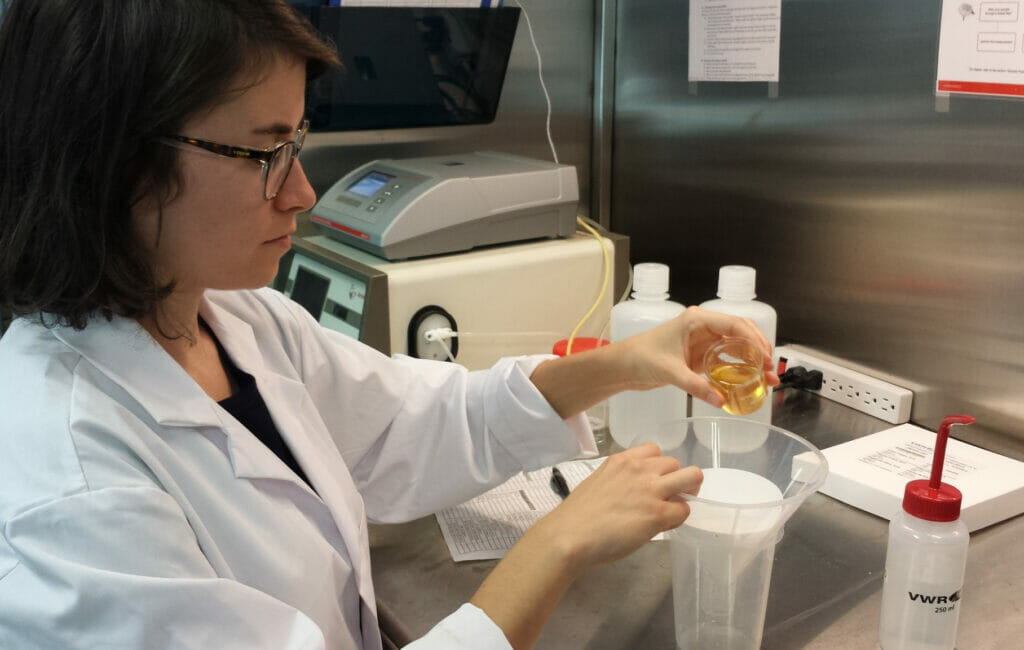
This summer, for example, we are collaborating with the Applied Genomics Centre from KPU which is working on developing new varieties of hops. They’ve got some great candidates that they’ve been growing at Barnside Brewing in Delta. They’ve turned the hops from last year’s crop into hop pellets, and now we are going to use them in our pilot brewery to see how they do as an ingredient for beer. They are experimental hops, so it’s exciting to collaborate on this project to see how these local hops will work in actual test batches.
It’s hard to separate teaching and brewing. I do try to bring real-life brewing scenarios or problems into the classroom to create more teachable moments. Sometimes I bring the brewery to the class. Sometimes I take the class to the brewery. I try to make it as real-life as possible. They can learn how to use one of the tools I’m talking about in the classroom to address a real problem in the brewhouse. For me, I think it’s very important for people to understand something in order to learn it.
Kim: How can people try the beers made by students in the KPU Brew Lab?
Martina: You can purchase KPU’s beers at the KPU Brew Lab on Friday afternoons all year long. There is a rotating selection of small-batch craft beers on tap. We have a very small brewing pilot system, a 2-hL system, so we end up with about eight 20L kegs, depending on the style. In the spring semester, from January through April, our second-year students develop their own signature beers. They package their final project beers in cans. You can also get a growler fill of your favourite.

When you visit the KPU Brew Lab on Friday afternoons, you can try experimental beers and sometimes even some collaboration beers. Recently some students came back to brew their signature beers again so that we could submit them to beer competitions. One that stands out for me was the beer that Kyle Jansen (who works at Five Roads Brewing) and Kayla Gibson (Faculty Brewing) made. It was a brown ale that tasted like a liquid biscuit. It was so delicious.
Kim: How is today’s future generation of brewers looking?
Martina: The future generation of brewers is looking really great. We have students that are curious and creative. They are making such creative beers for their final projects. We had a Vanilla Chai Latte Stout made by Lindsey Bartram (who is now working at Field House Brewing) and Kevin Reid. Colton Yakabuski (Parkside Brewery) and Jacob Wideman (Farm Country Brewing) made a New Zealand Belgium Pale Ale. One of the final projects this year won an award recently at the Canadian Brewing Awards. It was called Summertime by Mike Patterson (Parkside Brewery) and Michael Hodgson (Russell Brewing). Students are creative, innovative, and enthusiastic. They are curious and they ask lots of questions to understand what I’m teaching them. These are such great traits in students that are so keen to learn because they’ll continue to help improve the industry going forward. It’s really rewarding to see these students questioning the current methods and current practices.
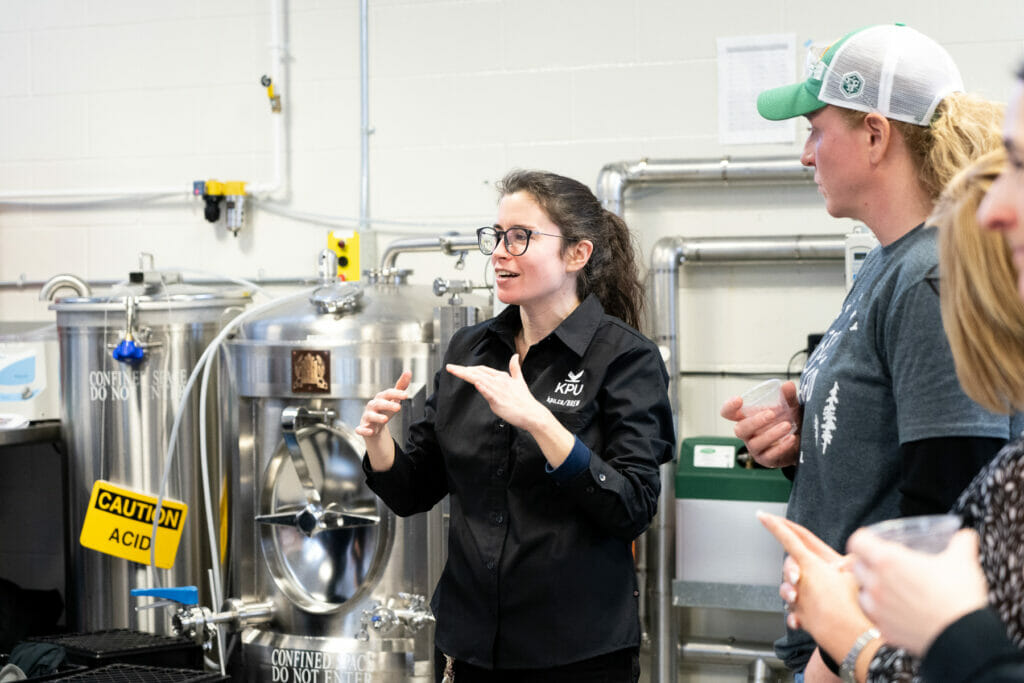
Kim: What are you seeing from a diversity perspective in your program right now?
Martina: Over the last few years, the diversity has increased a little bit each year. We have a few more women. We are up to about 20% women in the program now. We also have about 25% that are from diverse backgrounds (Latin, Asian, and Indian). I hope the diversity continues to grow every year, so we have a representation of our community in the classroom.

Kim: As an industry, what can we be doing to encourage more diversity?
Martina: KPU has added the Nancy More Award and the Diversity in Brewing Award as well as others that encourage students from diverse backgrounds to apply. These awards are helping to lower the financial barrier. I think that one of the most important things to get more women in the brewing program is to have more female role models from the industry. As there is more diversity in breweries and the brewing program, it welcomes and encourages more diversity. Female students see me and Nancy More on staff and see more opportunities for themselves.

Also, I think it’s important to see women students like Ashley Brooks go on and get jobs in brewing. Another example is Emily Kokonas, who was a student at KPU. She went on to work at Bakery Brewing and is now working in the brewing program at KPU. We are increasing the number of role models that will help attract more women to the program.
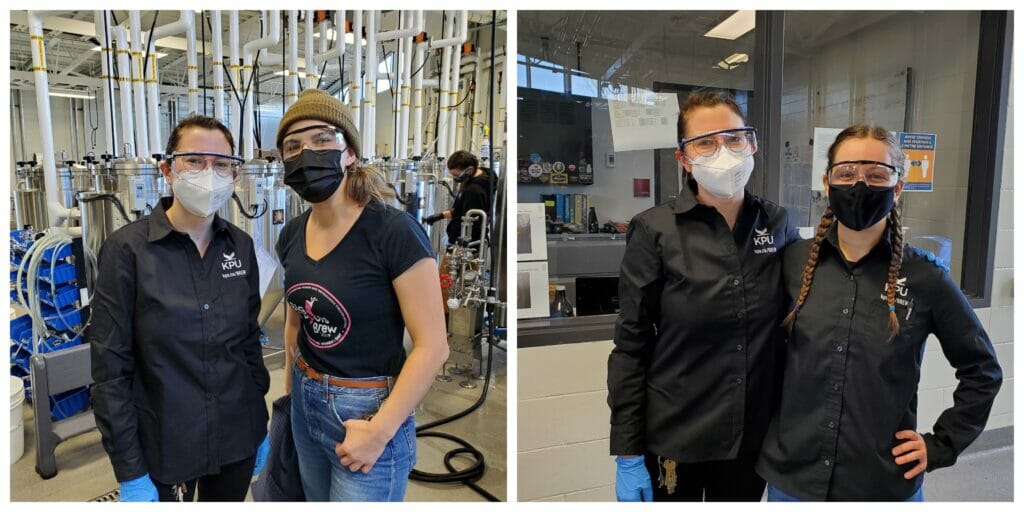
Nancy More is such a pioneer in the craft beer industry. We are so lucky and grateful to have her as part of our team. Not only is she an amazing leader, but she also has tons of experience from being in the industry for 40 years. She’s such a great example for the students to see.
Kim: What are some of your favourite craft beer festivals?
Martina: I really enjoy the Great Canadian Beer Festival in Victoria. It has such diversity in the beer offerings, featuring breweries in BC, Alberta, and beyond. It’s a cozy festival with such a big mix of breweries from places that I can’t necessarily go and visit myself. I also really enjoy the Fort Langley Beer and Food Festival. I enjoy seeing and connecting with my students at this local festival.
Kim: Now that people are beginning to travel again, where in BC is your next spot to go adventuring?
Martina: I love Victoria and I am really looking forward to visiting again soon. It’s such a quaint and walkable city. I love riding my bike there along the boardwalk. The brewing scene is so awesome in Victoria and I’m excited to go check out the breweries again. île Sauvage Brewing is a brewery I love to visit, and I also enjoy going to Spinnakers Brewpub for a late breakfast and beer. I’m also excited to see KPU alums Amara Houle who’s now working at Category 12 Brewing and Kyle York at Craft Beer Market, once they’re open in Victoria.
In addition to checking out the craft beer scene in places that I visit, I also enjoy hiking, being outside, and visiting lakes.
Kim: What do you love about the craft beer scene in Langley?
Martina: It has developed so much in the last few years. There were very few options to go for a beer after work. Now there’s Farm Country Brewing, Camp Beer Co., Trading Post Brewing, and Five Roads Brewing just five minutes away from work, as well as Dead Frog Brewery, which was one of the first in Langley. These breweries are offering some really tasty beers and great experiences. The industry is friendly, and as there are a number of students and alumni from KPU working in these breweries, it feels very friendly and collaborative in these locations.
Even after students graduate, KPU Brewing instructors stay connected with alumni, often visiting the breweries they work at. Recent grad Kyle Jansen is now a brewer at Five Roads Brewing in Langley and instructors Martina Solano Bielen, Emily Kokonas and Nancy More stopped by to taste some of his work.
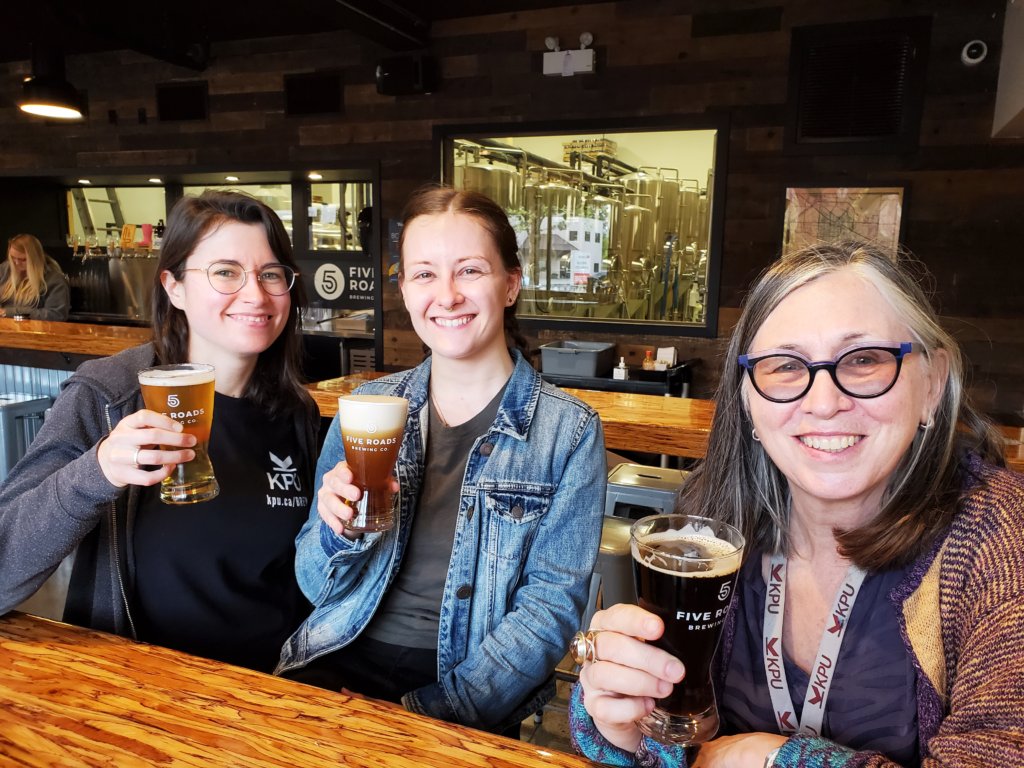
Kim: Tell me about some hidden gems in the Langley area?
Martina: I discovered this ramen place in Langley called Akedo Showten Ramen+Gyoza. It was a delicious surprise. The Barley Merchant also has really tasty food, especially the wings, and a really great selection of craft beers. The Raving Gamer is also a fun spot to go to if you are looking to pair your beer and food with some board games. Additionally, every Thursday in the summer, KPU hosts a veggie sale where they sell the produce grown in the greenhouses by students. Their raspberries are amazing!
Kim: Who else in the craft beer industry do you find interesting and why?
Martina: I was thinking about this a lot because there are so many interesting people in the brewing industry. Miguel Molina used to be one of our students. He was working for 33 Acres Brewing, and he’s now the head brewer at Boardwalk Brewing in Port Coquitlam on the North of the Fraser Ale Trail. He’s very passionate and really enjoys brewing science. I think he’s pretty cool, and I think he would be a great person for you to speak with next.
Stay tuned for the next installment of the Hops Among Friends blog series, where I speak with Miguel from Boardwalk Brewing. Until then, cheers!






